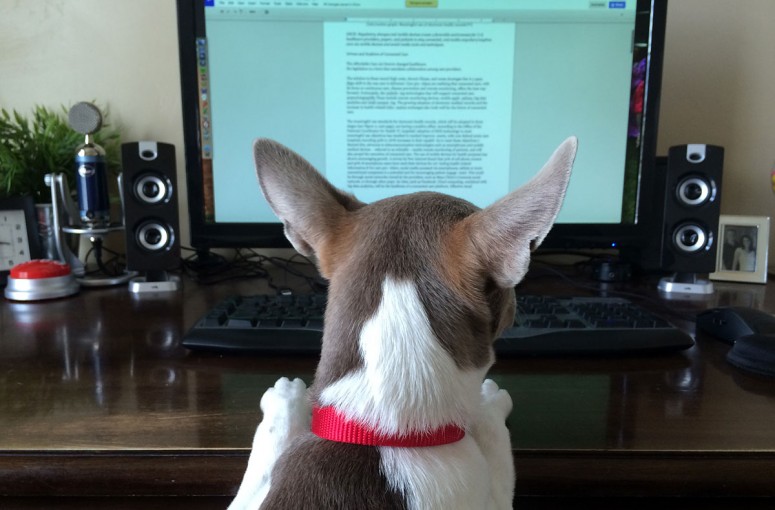Wasting away: 5 reasons people work too much

Photo: Blake Snow
Americans rank near the bottom in work-life balance because we work more than anyone, that much we know. (Caveat: We don’t work more than we used to, according to decades of research by John Robinson. We just perceive busy-ness as work and fill our free time with it. More on that later.)
But we don’t have to work as much as we do. Quite the opposite, in fact. “Researchers note that productivity rates have risen, which theoretically lets many people be just as comfortable as previous generations while working less. Yet they choose not to,” reports the New York Times. Even visionaries admit as much. “The idea that everyone needs to work frantically is just not true,” says Google CEO Larry Page. “Reducing the workweek is one way to solve the problem.”
I decided to do just that recently in switching from a five to four-day workweek. Like after I quit working nights and weekends, I won’t ever go back (given the choice). In four days, I’ve gotten just as much done as I did in five, because I waste less time now. As the forward-thinking Jason Fried explains, “Constraining time encourages quality time. When you have a compressed workweek, you focus on what’s important.”
So we have evidence that all this snazzy technology lightens our load, increases our productivity, and allows us to work less. And yet we still choose to work more than we need to. Why?! I’ve researched the issue for my book and came away with the following five answers:
1. We trick ourselves into thinking we’re “important” by working long hours. People want their lives to have meaning. They don’t want a third of it (i.e. the average time spent working) to be spent in vain. So we delude ourselves with grandeur and meaning by working more hours, which on the surface would suggest more importance. But quantity is not the same as quality. According to The New Yorker, overworking is just a popular way to reinforce the lie that our work has some cosmic purpose. It doesn’t. Please don’t mistake me. I believe work can and should have meaning. With exception to managerial accounting, I love my job. But if I’m really being honest, my epitaph should read: “Occupation: Helped companies sell more widgets with written words.” I’m not that big of a deal. Yes, industry and economy and my small role in that is an important endeavor. But it’s not that important. It’s not as meaningful as sharing a smile with someone, realizing your child will be smarter than you, feeling insignificant amid a majestic landscape, experiencing and nurturing true love, jumping the wake, watching an underdog upset the establishment, riding a longboard for the first time, or eating a homemade chocolate chip cookie. The sooner we accept our dispensability and nothingness, the sooner we’ll rightfully prioritize our lives.
2. It’s easier to measure hours and dollars than leisure or happiness. Humans like to keep score, get ahead, and keep up with the Joneses. One of the easiest ways to do that now is out-scheduling, staying busy, or working more they do. In other words, measuring happiness and leisure is harder to do. So we measure hours worked, money accumulated, or even the misguided places visited instead. In doing so, we remain firmly on the gerbil wheel.
3. We mistake busy-ness with productivity. Have you ever wondered why some people bandy on about how busy they are? “I’m so busy!” they exclaim. “I don’t even sleep!” They do this a la George Constanza because they’re inconsiderate of others (more on that here) and similar to reason no. 1, they’re attempting to inject meaning into the otherwise trivial choices they make. Again, staying busy is easier than finding purpose. It’s why we stay late at the office after a full day of wasted productivity. It’s why we’re incapable of leaving the office early, even though it’s obvious our minds need a break. It’s how we further lie to ourselves about the “work” that we do.
4. Many of us are self-absorbed and one-dimensional. On average, people work eight hours, sleep eight hours, and split the rest of their day between varying degrees of hobbies, pastimes, way too much TV, and other personal choices (aka liesure). Next to sleep, many of us will spend more time doing one job than anything else, so we naturally identify more with than one thing than anything else. Some of us even let that one thing wholly identify us. When that happens, we naturally spend more time doing that one thing because it’s what we’re most familiar and comfortable doing. That’s how people become one-dimensional. It’s how we become boring, uncultured, narcissistic, and incapable of carrying on a conversation beyond work. It’s why many of us overwork because it’s the only thing we feel we’re good and/or valued at.
5. It’s ingrained in our culture; it’s what Americans do. A hard work ethic is a wonderful thing and Americans undeniably have that. We’re also optimistic and hopeful. But we could be more confident about a reduced work week and start working smarter instead of just longer. As respected economist John Maynard Keynes argued in his famous 1930 essay, which predicted our inability to take advantage of abundant leisure, “We have been trained too long to strive and not to enjoy.”
But old dogs can learn new tricks. We can break the cycle of overwork. I’m starting with the man in the mirror. E tu?
